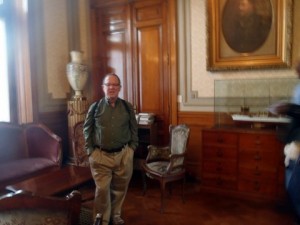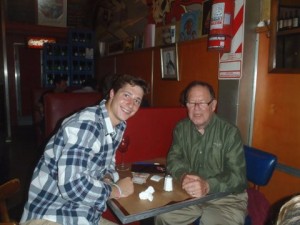
When I went for a walk this morning, I got really confused; I could not tell whether I was in Vienna, Budapest or Paris. I had been warned that the city was deceptively European, an impression confirmed later when we walked between our visits through the main square—with statues of San Martin—surrounded by palaces built by land barons late 19th century with Empire roofs that could have been in any one of those cities. As our local guide gushed, this is the “Paris” of South America. The area where our hotel is located is on Reconquista (maybe referring to the Spanish reconquest of Iberia from the Moors, maybe referring to the independence movement in Latin America, a by product of the Napoleonic wars, started when Napoleon put his brother on the throne of Spain) and Paraguay streets, but could—with its cobbled narrow streets and small shops be somewhere in Europe. But in the 19th century EVERY civilized city wanted to be Paris. (Not sure what that says about Chicago….)
Our first visit today was in a building that could have been a palace; built in 1914 to house the Navy Department, its gilded doorway, wooden library, comfortable old boy chairs was in fact nicer than some of the palaces I’ve been in in Europe. Coincidentally, it was the 100th anniversary of the opening of the building, and there was a celebration welcoming brass from the South American navies. I felt a little out of place without gold braid, but we were there to visit with a lawyer who has sat on Argentina’s judicial committee for a number of years, a body instituted 20 years ago to provide choices for judgeships to the President, who until then had put his own men (usually men) in for life with few checks or balances. Remember, I said the civilian rule in this part of the world is fairly recent—remember the Falklands War?
His talk brought to mind some of the hazards of the flat world—hazards especially to the losers. As I’ve told my students, neither organizations nor people react well to change, and the existence of the nation-state and political parties and different interests serves as speed bumps in that flat road. In the case of Argentina—a country of 40 million, 13 million of whom live in the environs of Buenos Aires—there’s a tug (as there is in most countries) between the protection of jobs and the protection of consumers, for whom the flat world means greater access to goods, usually for less. As in Brazil, the effort to protect jobs has sometimes prevented businesses from adapting to competition. In addition, the system is riddled with corruption and businesses with inefficiencies. As in other Latin American countries, there is an election in the next year, and businesses, we were told, were reluctant to invest until then.
Lunch was in an Argentine restaurant with pasta and the ever present grass fed (90% of the cattle are grass fed), with some concession to the vegetarians in our midst (pasta). The steaks were huge, as usual, and about half of it would have stood in for a meal for three days. We were also introduced to a pancake called dulche la leche, a sweet crepe with caramel sauce that our guide said was too sweet for most Americans. I had to confess to her that “my name is Fred, and I’m a sweetaholic”, but I confess (as did half our group, that the meaty lunch precluded much for dinner!
The second visit was to an entrepreneurial company that provides IT services in 30 countries, but is based in Argentina, showing that the flat world reaches here too.It is the largest provider in Mexico and Argentina, third largest in Columbia, and has the largest number of Spanish speaking consultants for SAP. They pointed out that the GDP has been rising, but so has inflation, ranging from 25-35% (wow), which led to a major devaluation in January, and the intervention of the government to control prices. The exchange rate last year ranged from 6 (legal) to 12 (black market), but the government has pegged the peso to the dollar ratio at 8-1. I understand that you can go to the black market, though, and still get 10 or 11. The government has also limited the outflow of dollars, which has led to a thriving black market in dollars, which bring a better ratio on the street. The government is controlling prices, and pushing some industries more than others—e.g., IT services. Neovis, the company we visited, is one of 1600 firms, employing 80,000 in Argentina. Still, the major exports are agricultural—machinery and soybean, and the major imports are gas and oil.

I had a real treat—a dinner with one of my advisees who is studying this semester in Buenos Aires. We made plans to meet before I came down here, and he took me to a local restaurant, and talked about the difficulties of doing business here, and shared his observations about what he’d learned, as much about himself as about Latin America. He lived the Confucian saying, “It is a pleasure to welcome guests who come from afar,” and it was good to catch up with an IWU student. He’s looking forward to going home (he studied in Barcelona as well, and says this is a tougher place to live than Europe), but admitted “it’s a great place to visit.” As long as you don’t overdo the steak. As I said, Argentina is a great place for meat, but I can feel my arteries hardening….I had pasta tonight.